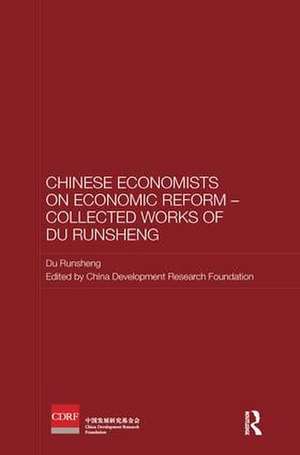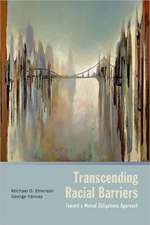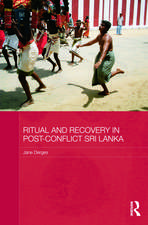Chinese Economists on Economic Reform – Collected Works of Du Runsheng: Routledge Studies on the Chinese Economy
Autor Du Runsheng Editat de China Development Research Foundationen Limba Engleză Paperback – 20 apr 2018
Du Runsheng (1913-) has made major contributions to policy making on land reform, rural development and science policy. Politically active from the 1930s, when he served as a guerrilla leader fighting Japanese aggression, and in the 1940s, when he was involved in the War of Liberation (1945-49), he has held many Chinese Communist Party posts. He was secretary-general of the Chinese Academy of Sciences in the late 1950s, responsible for drafting the 1961 policy document which urged respect for intellectuals. Attacked and persecuted during the Cultural Revolution (1966-76), he was for most of the 1980s in charge of research on rural economic reform and rural development strategies.
The book is published in association with China Development Research Foundation, one of the leading economic and social think tanks in China, where many of the theoretical foundations and policy details of economic reform were formulated.
| Toate formatele și edițiile | Preț | Express |
|---|---|---|
| Paperback (1) | 190.63 lei 6-8 săpt. | |
| Taylor & Francis – 20 apr 2018 | 190.63 lei 6-8 săpt. | |
| Hardback (1) | 571.14 lei 6-8 săpt. | |
| Taylor & Francis – 24 dec 2013 | 571.14 lei 6-8 săpt. |
Din seria Routledge Studies on the Chinese Economy
- 9%
 Preț: 1076.00 lei
Preț: 1076.00 lei -
 Preț: 266.72 lei
Preț: 266.72 lei -
 Preț: 341.55 lei
Preț: 341.55 lei - 18%
 Preț: 1044.48 lei
Preț: 1044.48 lei - 18%
 Preț: 1039.36 lei
Preț: 1039.36 lei - 18%
 Preț: 1036.31 lei
Preț: 1036.31 lei - 18%
 Preț: 979.22 lei
Preț: 979.22 lei -
 Preț: 266.83 lei
Preț: 266.83 lei - 18%
 Preț: 1034.60 lei
Preț: 1034.60 lei -
 Preț: 431.81 lei
Preț: 431.81 lei -
 Preț: 454.24 lei
Preț: 454.24 lei - 18%
 Preț: 1318.37 lei
Preț: 1318.37 lei -
 Preț: 118.05 lei
Preț: 118.05 lei - 47%
 Preț: 600.88 lei
Preț: 600.88 lei - 18%
 Preț: 1090.72 lei
Preț: 1090.72 lei - 18%
 Preț: 903.20 lei
Preț: 903.20 lei - 18%
 Preț: 1040.39 lei
Preț: 1040.39 lei -
 Preț: 262.99 lei
Preț: 262.99 lei - 26%
 Preț: 765.11 lei
Preț: 765.11 lei -
 Preț: 384.27 lei
Preț: 384.27 lei - 18%
 Preț: 1041.08 lei
Preț: 1041.08 lei - 18%
 Preț: 1249.70 lei
Preț: 1249.70 lei - 18%
 Preț: 776.74 lei
Preț: 776.74 lei - 18%
 Preț: 689.68 lei
Preț: 689.68 lei -
 Preț: 396.25 lei
Preț: 396.25 lei - 25%
 Preț: 797.21 lei
Preț: 797.21 lei - 18%
 Preț: 1199.40 lei
Preț: 1199.40 lei - 25%
 Preț: 823.97 lei
Preț: 823.97 lei - 18%
 Preț: 1034.94 lei
Preț: 1034.94 lei - 18%
 Preț: 983.09 lei
Preț: 983.09 lei - 18%
 Preț: 1040.39 lei
Preț: 1040.39 lei - 18%
 Preț: 990.13 lei
Preț: 990.13 lei - 18%
 Preț: 1046.19 lei
Preț: 1046.19 lei -
 Preț: 341.08 lei
Preț: 341.08 lei - 18%
 Preț: 929.62 lei
Preț: 929.62 lei - 18%
 Preț: 1091.33 lei
Preț: 1091.33 lei - 25%
 Preț: 853.90 lei
Preț: 853.90 lei -
 Preț: 404.82 lei
Preț: 404.82 lei - 18%
 Preț: 1050.62 lei
Preț: 1050.62 lei -
 Preț: 171.13 lei
Preț: 171.13 lei -
 Preț: 386.01 lei
Preț: 386.01 lei - 18%
 Preț: 980.00 lei
Preț: 980.00 lei - 18%
 Preț: 1096.82 lei
Preț: 1096.82 lei - 18%
 Preț: 1037.34 lei
Preț: 1037.34 lei - 25%
 Preț: 543.84 lei
Preț: 543.84 lei -
 Preț: 381.02 lei
Preț: 381.02 lei
Preț: 190.63 lei
Preț vechi: 333.88 lei
-43% Nou
Puncte Express: 286
Preț estimativ în valută:
36.49€ • 37.93$ • 30.26£
36.49€ • 37.93$ • 30.26£
Carte tipărită la comandă
Livrare economică 05-19 februarie 25
Preluare comenzi: 021 569.72.76
Specificații
ISBN-13: 9781138595828
ISBN-10: 1138595829
Pagini: 240
Dimensiuni: 156 x 234 x 23 mm
Greutate: 0.44 kg
Ediția:1
Editura: Taylor & Francis
Colecția Routledge
Seria Routledge Studies on the Chinese Economy
Locul publicării:Oxford, United Kingdom
ISBN-10: 1138595829
Pagini: 240
Dimensiuni: 156 x 234 x 23 mm
Greutate: 0.44 kg
Ediția:1
Editura: Taylor & Francis
Colecția Routledge
Seria Routledge Studies on the Chinese Economy
Locul publicării:Oxford, United Kingdom
Public țintă
PostgraduateCuprins
Foreword by Wang Mengkui Author’s Preface 1. On a responsibility system for agricultural production (September 14, 1980) 2. Some opinions on rural economic policies (February 1981) 3. The historic transformation in [the Party’s] rural work (September 4, 1982) 4. The household contract system linking remuneration to output represents a new development in the rural cooperative economy (November 23, 1982) 5. Explanations on some issues regarding current rural economic policies (December 31, 1982) 6. Explanation of the CPC Central Committee’s notice on rural work in 1984 (December 18, 1983) 7. Several ‘social objectives’ behind developing a rural commodity economy (December 20, 1984) 8. Getting rich first, later, and together (December 20, 1985) 9. Raise the economic standing of agriculture through reliance on science and technology (April 11, 1986) 10. Foreign-oriented development strategy for coastal regions (December 3, 1987) 11. Economic Development in mountainous areas is a major focus for research (October 1988) 12. Reforms in socialist countries must pass the ‘test of the market’ and the ‘test of democracy’ (May 9, 1989) 13. The objective of reform: establish a market economy under socialist conditions (October 1992) 14. Cooperative shareholding systems featuring land-to-shares conversion (January 1994) 15. Reform of ‘supply-and-marketing’ cooperatives (November 7, 1995) 16. Stabilizing the household contract system -- how to understand the ‘Two Leaps’ correctly (January 1996) 17. Adhere to strategies that allow for sustainable development (December 11, 1996) 18. Contracted family operations should be kept stable for a long time (October 27, 1998) 19. Farmers should be ‘free men’ (December 15, 1998) 20. Sustainable utilization of water resources (March 11, 1999) 20. Use the economy to motivate people, and use democratic politics to unite people (October 1999) 21. Historical status of small- and medium-sized enterprises (October 24, 1999) 22. Agricultural industrialization and ‘dragon-headed’ [leading] enterprises (November 10, 1999) 23. Thoughts on the Wenzhou economic model (May 25, 2000) 24. Brief remarks on innovation (July 18, 2000) 25. Prospects for and vitality of a ‘mixed economy’ (May 13, 2001) 26. Give farmers national citizenship (June 1, 2001) 27. Industry must repay agriculture (December 5, 2001) 28. Raise the degree to which farmers are represented through organizations (December 6, 2001) 29. A recommendation to exempt farmers from taxation(November 9, 2002) 30. The non-State-owned economy should be owned and operated by, and for the benefit of, the people (November 11, 2002) 31. A non-publicly-owned forest industry (January 22, 2003) 32. Systems innovation in rural communities (November 6, 2003) 33. Thoughts on poverty alleviation (April 3, 2004) 34. Deng Xiaoping and China’s rural reform (August 20, 2004) 35. ‘Urbanized towns’ are the result of economic development (August 28, 2004) 36. The critical element in our overall planning for urban-rural development: China’s rural migrant workers (February 19, 2006) 37. Changing ‘due consideration for equity’ into ‘a concerted focus on equity’ (August 15, 2006) 38. Choosing how we go about ‘building a new countryside’ (September 26, 2006) 39. Transform agriculture into a ‘knowledge economy’ (February 15, 2007) 40. Selecting the proper path for economic development (September 2007) 41. Adhere to ‘socialism with Chinese characteristics’ (April 2008) 42. New options for economic development (June 3, 2008)
Descriere
This book is part of a series which makes available to English-speaking audiences the work of the individual Chinese economists who were the architects of China’s economic reform. The series provides an inside view of China’s economic reform, revealing the thinking of the reformers themselves, unlike many other books on China’s economic reform which are written by outside observers.


















